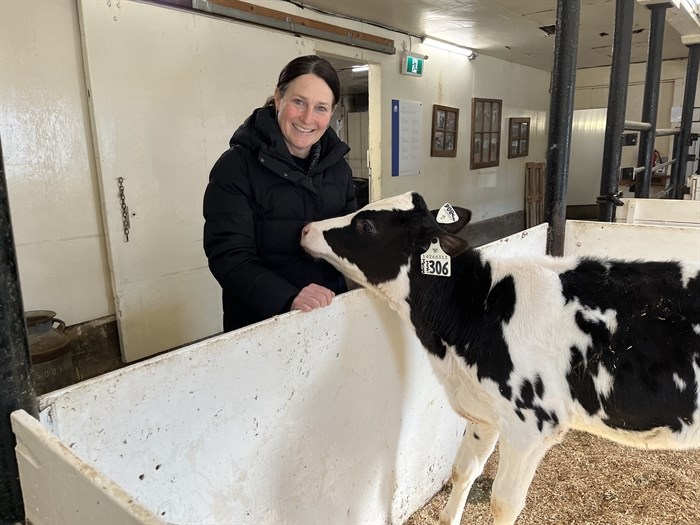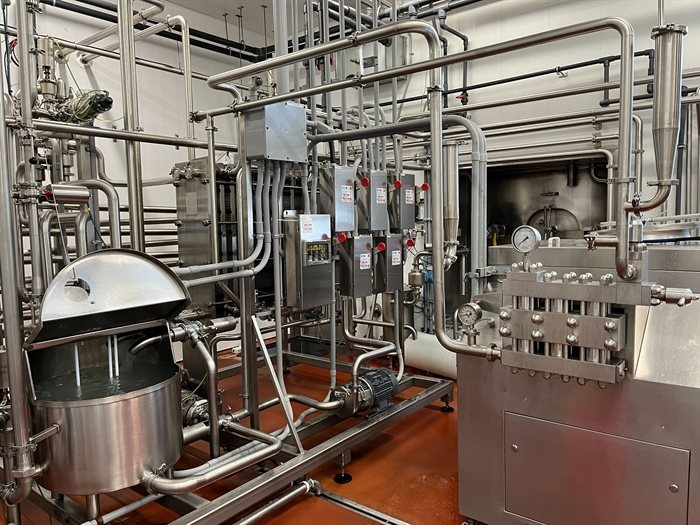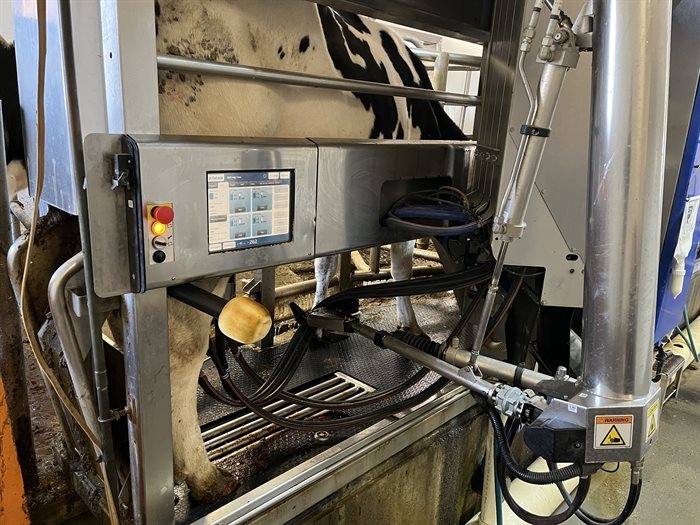GOT MILK?: This Kamloops farm doesn't just milk cows, it's a self-sufficient processor

On a sunny winter day at Blackwell Dairy Farm in Kamloops, the dairy cows can be spotted in a long lineup with their heads poking out of a barn, munching on feed from a trough.
“They’re really enjoying the sun today,” said farm manager Laura Hunter when iNFOnews.ca stopped by this week.
There are 120 cows in the herd including 70 milkers, along with dry cows and calves, and they produce thousands of litres of milk per week that goes to stores in the Kamloops area, Okanagan and Salmon Arm.
Something unique about the farm is that it both produces milk and processes it, and since first opening in 1913, has become a self-sufficient farm-to-table operation working alongside milk producers in the Interior, without historical reliance on connections in the Lower Mainland.
“My dad (Ted Blackwell) has always been passionate that we need a processing plant in the Interior to support farming in the Interior and make sure our food supply chain is secure,” Hunter said.
For decades the milk was shipped to a processor in Armstrong, but in the early 1980s when that plant shut down so Blackwell Dairy built their own.
“Ninety per cent of milk processing is done by three large companies in the Lower Mainland,” Hunter said. “We are one of three processors in the Interior and being in the Interior is good when things go bad with supply disruptions.”
When floods hit southern BC in 2021 and a major transportation route between Hope and Merritt was washed out, some dairy farmers were struggling to get their products into stores.
Blackwell Dairy increased milk production from 20,000 litres a week to 20,000 a day by processing neighbouring dairy farm milk to fill the void, but Hunter said, the high production was short lived.
“We have the capacity, the limitation is shelf space on grocery store shelves, the big producers own it, they pay a lot of money for it so they have full control of the market,” Hunter said. “As soon as the roads opened again, they took control of shelf space again.”
More recently, the farm cut dependence on the Lower Mainland by sourcing milk jugs from a company in Kamloops.
“We were getting our jugs from Vancouver because that’s where they come from but we needed them every two weeks,” she said. “It would fill up our storage and looking at transportation costs going back and forth, we were spending a lot of money.”
Blackwell Dairy is the processing plant for neighbouring farms in the Kamloops area and when they need more milk to fill orders, the farm relies on dairy farmers in the Okanagan to truck more in to be processed and bottled.
READ MORE: 'It's hurtful': Okanagan vet frustrated by pet owners' misconceptions about rising costs
The dairy cows are milked with two voluntary milking system robots in an open milking area in a barn where the public can stop by and watch the process.
The cows can come in anytime they like and on average are milked 2.5 times per day. They wear necklaces with computer chips in them that allows the robot to identify them.
“The robot knows who it is and will only milk them when it has permission so the cow can’t just get milked 50 times per day,” Hunter said. “Every time they come in they get a little treat of grain.”
The robot not only identifies the cow, it knows the shape of its udder and automatically attaches the milking tubes. It tracks how fast the milk is coming out and when the speed of milk flow slows, it releases the tubes.
After milking, the machine sprays the udder with iodine to make sure it’s clean.
Every morning a worker ensures there hasn’t been problems with milking and if a machine went down, fixes and cleans it.
READ MORE: Okanagan Indian Band moves to buy O'Keefe Ranch
Attention goes to building fresh, clean beds for the cows because they produce milk when they’re lying down.
“The cows have social time, get up and eat, but the majority of the time they’re lying down so beds have to be comfortable," Hunter said.
The milk from Blackwell Dairy cows gets tested along with any milk coming in from other farms, to make sure it is free of antibiotics before it goes into the plant.
Growth hormones and antibiotics are illegal to use in Canada, and if antibiotics are detected in milk, the whole load is dumped.
“It’s common for people to wonder if the milk has antibiotics in it, it’s because of advertising,” she said. “There are advertisements for antibiotic free milk, so people think 'oh, then some might not be.”
READ MORE: BC government pauses aerial spray program for moths in Kamloops, Okanagan
Canadian dairy farmers like Blackwell have strict standards to meet when it comes to milk quality, animal health and well-being and the environment.
“There are lots of standard and farmers are inspected and have to meet those,” she said. “As farmers, we want to say ‘hey, this is the best quality milk in the world.’”
The processing plant has a much greater capacity to produce, but it takes more local sales to grow it.
“Our plant was built to do more than it is right now but we need to build on that local support, get those sales and get onto shelves.”
READ MORE: Trump's tariffs won't have serious short-term impacts on Kelowna, Kamloops businesses
When asked why local consumers might not be buying Blackwell Dairy milk, Hunter said it could be because of the higher cost or because the product isn’t in every store.
“Because we’re not doing 200,000 litres a day our costs are higher,” she said. “We’re not in every store, some stores have shelf space owned by another brand. If you want to see a product on the shelf, then ask the store. They want to look after their customers, so they’ll bring it in.”
Go here to learn more about Blackwell Dairy Farm and find stores carrying their milk products.
To contact a reporter for this story, email Shannon Ainslie or call 250-819-6089 or email the editor. You can also submit photos, videos or news tips to the newsroom and be entered to win a monthly prize draw.
We welcome your comments and opinions on our stories but play nice. We won't censor or delete comments unless they contain off-topic statements or links, unnecessary vulgarity, false facts, spam or obviously fake profiles. If you have any concerns about what you see in comments, email the editor in the link above. SUBSCRIBE to our awesome newsletter here.




